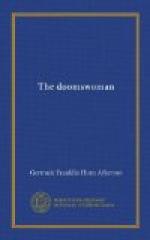“Thou hast cause to be proud of Reinaldo, for he sparkles like the spray of the fountain, and words are to him like a shower of leaves in autumn. And yet, and yet,” she added, with angry candor, “he has not a brain like Diego Estenega. He is not a man, but a devil.”
“A good brain has always a devil at the wheel; sharp eyes have sharper nerves behind; and lightning from a big soul flashes fear into a little one. Diego is not a devil,—I remember once I had a headache, and he bathed my head, and the water ran down my neck and gave me a cold which put me to bed for a week,—but he is the devil’s godson, and were he not the son of my enemy I should love him. His father was cruel and vicious—but smart, Holy Mary! Diego has his brain; but he has, too, the kind heart and gentle manner—Ay! Holy God!—Come, come: here are the horses. Call Prudencia, and we will go to the bark and see what the good captain has brought to tempt us.”
Four horses led by vaqueros, had entered the court-yard.
“Prudencia,” called Chonita.
A door opened, and a girl of small figure, with solemn dark eyes and cream-like skin, her hair hanging in heavy braids to her feet, stepped upon the corridor, draping a pink reboso about her head.
“I am here, my cousin,” she said, walking with all the dignity of the Spanish woman, despite her plump and inconsiderable person. “Thou art rested, Dona Eustaquia? Do we go to the ship, my uncle? and shall we buy this afternoon? God of my life! I wonder has he a high comb to make me look tall, and flesh-colored stockings. My own are gone with holes. I do not like white—”
“Hush thy chatter,” said her uncle. “How can I tell what the captain has until I see? Come, my children.”
We sprang to our saddles, Don Guillermo mounted heavily, and we cantered to the beach, followed by the ox-cart which would carry the fragile cargo home. A boat took us to the bark, which sat motionless on the placid channel. The captain greeted us with the lively welcome due to eager and frequent purchasers.
“Now, curb thy greed,” cried Don Guillermo, as the girls dropped down the companion-way, “for thou hast more now than thou canst wear in five years. God of my soul! if a bark came every day they would want every shred on board. My daughter could tapestry the old house with the shawls she has.”
When I reached the cabin I found the table covered with silks, satins, crepe, shawls, combs, articles of lacquer-ware, jewels, silk stockings, slippers, spangled tulle, handkerchiefs, lace, fans. The girls’ eyes were sparkling. Chonita clapped her hands and ran around the table, pressing to her lips the beautiful white things she quickly segregated, running her hand eagerly over the little slippers, hanging the lace about her shoulders, twisting a rope of garnets in her yellow hair.




